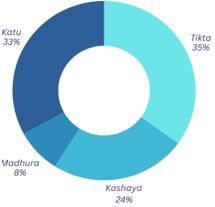Action of Bilwadi Agad in management of Food Poisoning w.s.r. to Visuchika - A Case Study
DOI:
https://doi.org/10.21760/jaims.10.1.46Keywords:
Visuchika, Bilwadi Agad, Gastroenteritis, VishaghnaAbstract
Bilwadi Agada is a polyherbal Ayurvedic formulation. It is a choice of drug in acute toxico-pathological conditions. The 13 ingredients of Bilwadi Agad are Bilwa, Surasa, Karanja, Nata, Suvaha, Haridra, Daruharidra, Triphala, Trikatu. It is indicated in various conditions such as Sarpa Dansha, Loota Visha, Unduru Visha, Vrischika Visha, Visuchika, Ajeerna, Gara Visha, Jwara Bhoota Badha etc. Drugs found in Bilwadi Agad mostly have the qualities of Deepana, Pachana, Anulomana, Shoolhara, Krimighna, Jwaraghna, and Vishaghna and it act on the Kapha-Vata. Visuchika is a condition in which vitiated Agni causes over-affection of Ama leading to expulsion of Doshas though both upper and lower passage. Food poisoning which is classified under acute gastroenteritis caused due to ingestion of food contaminated by either bacteria or nonbacterial toxins. It causes hypersecretion of fluid and electrolytes which is the underlying cause of watery consistency of stool in cases of food poisoning. This can be clinically corelated with the concept of Visuchika in ayurveda. Bilwadi Agad when used in such cases have seen to be effective in relieving the symptoms of food poisoning. The purpose of this paper is to explore the use of Bilwadi Agada as a treatment for Visuchika.
Downloads
References
Nagham A, Muhsin N, Anaam A. Review on Food poisoning (Types, Causes, Symptoms, Diagnosis, Treatment). 2021;3:54-61.
Acharya JT, editor. Charaka Samhita. 1st ed. Varanasi: Chaukhambha Surbharati Prakashana; 2008. p. 135. Vimana Sthana 2, Sloke no. 11.
Agnivesa. Charaka Samhita: Ayurveda Dipika Commentary of Chakrapanidatta. 1st ed. Varanasi: Chaukhamba Prakashan; 2013. p. 571. Chikitsa Sthana.
Garde GK. Sartha Vagbhat. 1st ed. Varanasi: Chaukhamba Surbharati Prakashan; 2018. ISBN:978-93-83721-83-2. Sutrasthan chptr 8, verse 7-9. p. 37.
Verma T, Sharma I. Management of food-poisoning through Ayurveda W.S.R. to Visuchika. World Journal of Pharmacy and Pharmaceutical Sciences. 2020;9(10):1271-1275.
Garde GK. Sartha Vagbhat. 1st ed. Varanasi: Chaukhamba Surbharati Prakashan; 2018. ISBN:978-93-83721-83-2. p. 467. p. 36-84, 85.
Bhishagacharya Paradkar H. Ashtanga Hridaya, Uttarsthana, Sarpavishapratishedha adhyaya. 7th ed. Varanasi: Chaukhamba Orientalia; 1982. p. 913.
Gogate VM. Dravyaguna Vidyana. 1st ed. Vaidyamitra Publication; 2018. ISBN:978-8189798505. p. 310, 432, 539.
Agrahari P, et al. A brief study on Zingiber officinale - A review. JDDTBP. 2015;3:20-27.
Sharma PV. Dravyaguna Vijyan. 1st ed. Varanasi: Chaukhmba Bharti Academy; 2011. p. 753-755, 758-760, 239-241, 363-365, 163-164, 537-539.
Sharma PV. Dravyaguna Vijyan. 1st ed. Varanasi: Chaukhmba Bharti Academy; 2011. p. 455-457.
Kamal, et al. A review on Bilwadi Agada and its indications. World Journal of Pharmacy and Pharmaceutical Sciences. 2021;10(3):344-345.
Benni JM, Jayanthi MK, Suresha RN. Evaluation of the anti-inflammatory activity of Aegle marmelos (Bilwa) root. Indian Journal of Pharmacology. 2011;43(4):393-397.















